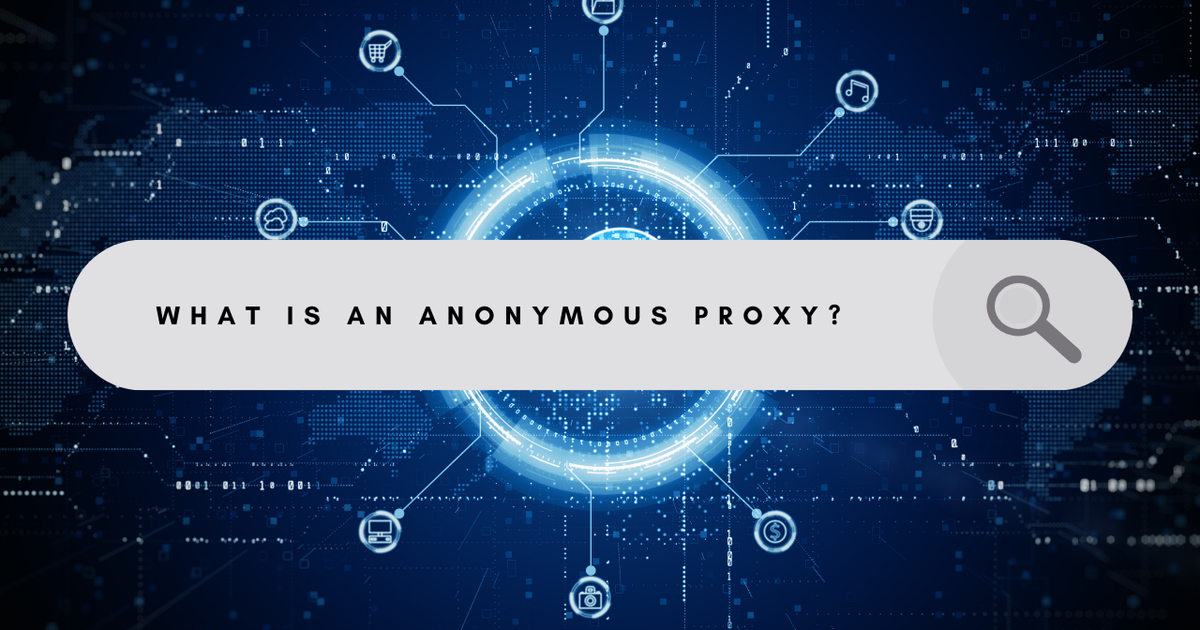What is an Anonymous Proxy
Discover proxy anonymity types and uses in our blog. Learn the advantages and risks of free proxies to make informed decisions.


- Tier of Proxy Privacy
- Anonymizing Proxies for Individual and Corporate Applications
- Is it Advisable To Opt for Free Anonymizing Proxies?
- Conclusion
- FAQs

One standout advantage of proxies is their exceptional capability to enhance online security. This characteristic is particularly prominent in anonymous proxies. Similar to various other proxy types, these proxies serve as intermediaries between users and web servers. Yet, what might be new information to some is that proxies come in different forms, each offering a distinct degree of anonymity.
This article aims to delve into the various categories of proxy anonymity and the practical applications of anonymous proxies. Furthermore, we will examine the advisability of utilizing free anonymous proxies. For an in-depth guide, check Serply's proxy solutions.
Tier of Proxy Privacy
Most proxies offer protection for the user’s data and a certain level of privacy, assuming they are sourced from a reputable, high-quality proxy server provider. However, there’s one scenario where anonymity is completely absent, and that’s when dealing with a transparent proxy. These proxies operate at the server level and often reveal the user’s IP address. Indeed, there are three distinct tiers of proxy privacy available. Learn more about the intricacies of proxy privacy on Serply's detailed explanations.
Tier 1: Premium Proxies
Also, referred to as high-anonymity proxies, elite proxy servers provide the highest level of privacy. They not only obscure the user’s IP address but also mask the use of a proxy itself. This makes them ideal for demanding data collection activities where confidentiality is paramount. They are detailed extensively in our comprehensive guide on elite proxies.
When elite proxies forward requests to the target server, they exclude specific headers that could reveal the user’s identity. To ensure complete anonymity, headers such such as Authorization, From, Proxy-Authorization, Proxy-Connection, Via and X-Forwarded-For might be eliminated.
Tier 2: Proxy Privacy
Anonymizing proxies offer intermediate anonymity. While they hide the user’s IP address, the target server can detect that a proxy mediates the connection. Different from elite proxies, certain headers, like the Via header, are transmitted to the server. Learn more about their use and management in our educational materials.
Given that websites can recognize these proxies, there’s a possibility of them being blocked. Therefore, in certain situations, opting for elite proxies may be more advantageous. As a workaround, rotating proxy servers can address this issue.
Tier 3: Clear Proxies
These proxies do not offer any form of anonymity for the user. They disclose the user’s IP address through the X-Forwarded-For header and maintain visibility of the proxy IP in the Via header.
One might question the purpose behind using a transparent proxy. In reality, transparent proxies are not typically utilized by users directly. Rather, they are set up on the server side to manage web traffic, often without the user’s knowledge that their connection is being routed through a proxy. For more insights into clear proxies and their typical applications, visit this section.
Anonymizing Proxies for Individual and Corporate Applications
Anonymizing proxies serves both personal and professional needs effectively by concealing IP addresses, and catering to a variety of scenarios.
For personal use, anonymizing proxies can significantly improve online privacy. They are ideal for those looking to evade targeted advertising, circumvent geographical restrictions, or safeguard their browsing history. Moreover, they offer a layer of defense against potential identity theft.
Business applications, however, present a different set of challenges. Although anonymizing proxies mask the original IP address, they may not always be perceived as regular internet users, limiting their utility to basic business functions.
Businesses often use anonymous proxies for tasks such as gathering competitive intelligence or conducting market research. However, for activities requiring a higher security level, such as analyzing customer sentiment through review sites, anonymous proxies may not suffice due to common restrictions like CAPTCHAs and IP blocking. In these instances, businesses might need to invest in elite proxies for enhanced capabilities.
It’s vital for users to carefully evaluate the specific purposes for employing an anonymizing proxy. While they are a good fit for individual objectives and some straightforward business applications, they may not be adequate for more intricate requirements. For those demanding tasks, exploring options like Residential Proxies, which are designed to handle complex operations like data collection or market analysis, is advisable. Detailed discussions on these applications can be found in Serply's comprehensive blogs.
Is it Advisable To Opt for Free Anonymizing Proxies?
As previously discussed, the cost of a proxy server varies, with some individuals suggesting that free proxies are a preferable choice. While the prospect of using free proxies may seem appealing, caution is advised. The reliability and security of free proxies are often questionable, making them a risky choice in many instances.
For instance, free proxies frequently lack support for HTTP(S) connection, essential for secure web browsing. Without these, your online activities could be exposed and subject to surveillance. Moreover, proxy servers have the capability to access users’ cookies, which poses a minimal concern when using a reputable proxy provider with robust privacy policies. However, this level of security and privacy is not assured with free proxies, potentially putting sensitive information in jeopardy.
Furthermore, while premium proxy providers strive to deliver superior service to their clients, the performance and safety of free proxies do not match up. Research has shown that a significant portion of free proxies available to the public are either unreliable or harboring malicious software.
Therefore, it is strongly advised to opt for proxies from a reputable and reliable provider. Doing so ensures a safer and more efficient online experience, free from the risks associated with free proxies. However, caution is advised. Delve into the pitfalls of free proxies through our in-depth analysis here.
Conclusion
In conclusion, anonymous proxies offer a viable option for users in need of a simple proxy solution that masks the IP address. Yet, it’s important to consider the intricacy of your needs before selecting a proxy server. For a smooth and trouble-free online experience, it’s essential to conduct thorough research and make an informed choice. For more guidance on making an informed choice, refer to our detailed discussion on the subject here.
FAQs
Q1. How to solve common anonymous proxy errors?
A1. Having an “Anonymous Proxy Detected” alert while using a proxy indicates that the target server has identified your proxy connection. This can be due to several reasons, such as your device leaking its real IP address, sending too many requests from the same IP, or using a proxy of poor quality.
Fortunately, there are several strategies you can use to resolve the “Anonymous Proxy Detected” message. Start by shutting down all applications before initiating proxy use. It’s also wise to clear your browser’s cookies and cache. If these steps do not work, consider updating your proxy rotation strategy, perhaps opting for shorter intervals between changes.
Besides the “Anonymous Proxy Detected” alerts, you may also run into specific proxy error codes, each with potential simple fixes. Discover strategies to resolve these issues in our extensive troubleshooting guide here.